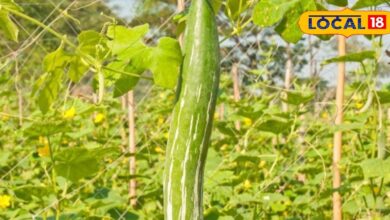शरीर के लिए चमत्कारी औषधि है ये चीज, डायबिटीज-वजन को करती है कंट्रोल, हार्ट और हड्डियों को बनाती है स्ट्रांग

Last Updated:March 11, 2025, 10:41 IST
Dried Plums Health Benefits: सूखे आलूबुखारे का इस्तेमाल पाचन शक्ति, हड्डियों की मजबूती, वजन घटाने और दिल की बीमारियों में लाभकारी है. आयुर्वेदिक चिकित्सक डॉ राघवेंद्र चौधरी के अनुसार सूखे आलूबुखारे का इस्तेमाल …और पढ़ेंX

सुखा आलू बुखारा
हाइलाइट्स
सूखे आलूबुखारे से पाचन शक्ति मजबूत होती है.हड्डियों को ताकत और दिल की बीमारियों में लाभकारी.वजन घटाने और शुगर लेवल नियंत्रित करने में मददगार.
बागपत. सूखे आलूबुखारा एक चमत्कारी आयुर्वेदिक औषधि है, जो शरीर को स्वस्थ बनाए रखने में काफी ज्यादा मददगार साबित होता है. सूखे आलूबुखारे का इस्तेमाल करने से पाचन शक्ति दुरुस्त होती है और हड्डियों को ताकत मिलती है. यह औषधि वजन घटाने में और दिल की बीमारियों में वरदान की तरह काम करती है. इसका इस्तेमाल चिकित्सक की देखरेख में और जरूरी मात्रा में करना चाहिए.
आयुर्वेदिक चिकित्सक डॉक्टर राघवेंद्र चौधरी ने Local 18 से बातचीत करते हुए बताया कि सूखे आलूबुखारे का इस्तेमाल करने से शरीर को चौंकाने वाले फायदे होते हैं. यह एक ऐसी औषधि है, जो आसानी से बाजार में उपलब्ध होती है. इसके इस्तेमाल से पाचन शक्ति मजबूत होती है और शरीर को ताकत मिलती है. सूखे आलूबुखारे का इस्तेमाल करने से हड्डियों में मजबूती आती है और यह शुगर लेवल को नियंत्रित बनाए रखने में भी काफी ज्यादा मददगार साबित होता है. सूखे आलूबुखारे का इस्तेमाल करने से हृदय संबंधित समस्याओं में तेजी से राहत मिलती है और यह आंखों की रोशनी बढ़ाने के साथ स्किन से जुड़ी समस्याओं में भी तेजी से राहत देने का काम करता है. यह एक ऐसी औषधि है, जो शरीर के लिए वरदान की तरह काम करती और शरीर को लंबे समय तक स्वस्थ बनाए रखने में काफी ज्यादा मददगार साबित होती है.
आयुर्वेदिक चिकित्सक डॉ राघवेंद्र चौधरी ने बताया कि सूखे आलूबुखारे का इस्तेमाल आप कई प्रकार से कर सकते हैं. इसका चूर्ण बनाकर आप इस्तेमाल कर सकते हैं और पानी में भिगोकर भी इसका इस्तेमाल कर सकते हैं. इसका चूर्ण दूध और पानी के साथ इस्तेमाल किया जा सकता है. वहीं इसका इस्तेमाल जरूरी मात्रा में और चिकित्सक की देखरेख में ही करना चाहिए.
Location :
Baghpat,Baghpat,Uttar Pradesh
First Published :
March 11, 2025, 10:41 IST
homelifestyle
शरीर के लिए चमत्कारी औषधि है ये चीज, डायबिटीज-वजन को करती है कंट्रोल
Disclaimer: इस खबर में दी गई दवा/औषधि और स्वास्थ्य से जुड़ी सलाह, एक्सपर्ट्स से की गई बातचीत के आधार पर है. यह सामान्य जानकारी है, व्यक्तिगत सलाह नहीं. इसलिए डॉक्टर्स से परामर्श के बाद ही कोई चीज उपयोग करें. Local-18 किसी भी उपयोग से होने वाले नुकसान के लिए जिम्मेदार नहीं होगा.




